West Falkland covers an area of 4532sq kilometres (1750sq miles). The highest point, Mount Adam at 700m (2300ft), is part of the Hornby Hills, the main mountain range on the island running north/south and geologically a continuation of the Wickham Heights on East Falkland. The southern coast has high cliffs with Cape Meredith t the southernmost point. There are no towns on West Falkland but small settlements which before subdivision into smaller farming units that began in the 1980’s, were large sheep farming stations that employed workers. There are now 34 owner-occupied farms on the West. The population is of mainland West Falkland is 160 (2016 census) and home to around 180,000 sheep, 997 cattle, 197 horses and 133 dogs.
West Falkland Original Settlements |
|
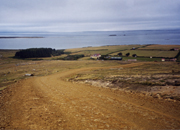 Hill Cove Hill Cove
|
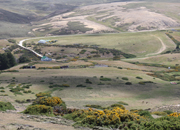 Roy Cove Roy Cove
|
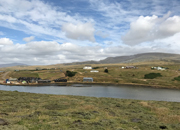 Port Howard Port Howard
|
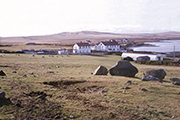 Chartres Chartres
|
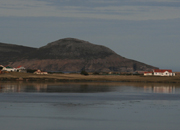 Fox Bay East Fox Bay East
|
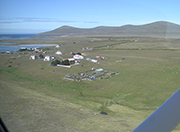 Fox Bay West Fox Bay West
|
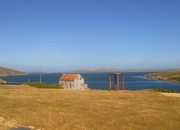 Port Stephens Port Stephens
|
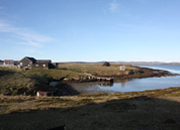 Dunnose Head Dunnose Head
|
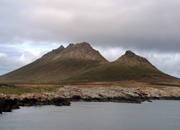 West Islands West Islands
|
Settlement
In June 1867 West Falklands officially opened to settlers. By May 1868 all available land on West Falklands was leased out to 8 settlers. A lease might be £10 per year for 10 years. Settlers were required to build a house and to and stock the station with 50 cattle or horses or 100 sheep within 12 months, a difficult task given their situation. Unable to get sheep from East Falklands as the Falkland Islands Company refused to sell to them, the settlers had to look to the river Plate area for stock. Sheep scab was rife and difficult to get rid of.
In 1839 wild cattle had been introduced to West Falkland. Charles Melville, master of the schooner ‘Montgomery’ took 55 cows and 11 bulls from Port Pleasant, East Falklands and crossed the sound to land them at White Rock Bay on West Falklands. Moore reports 18 years later that in the area of the Warrah River the cattle were fairly prolific and estimated their number to be between two and three thousand. It was necessary to cull them to make way for sheep as they took the grass and broke down fences. As sheep farming developed, the cattle provided a ready income for the settlers with their hides and meat. At the time there were itinerant gauchos who could be hired to help hunt them. Some of these were based at White Rock. Occupation leases required that a declaration be made every six months of the number and description of wild animals killed by the settler. Payment was 4 shillings per bull and 16 shillings for every animal killed for consumption. Any wild cattle captured for taming were free as long as they were branded and a return was made every 6 months of the animals.
1867 (15 November) James Ludgrove Waldron took a lease out on Port Howard
1867 24 December Edward Packe was first granted an occupation licence for Fox Bay East
1868 James McClymont first leased Chartres River Station
1868 Messrs Bertrand and Switzer were granted an occupation licence of what was to become Hill Cove, and in 1905 Holmested and Blake applied to purchase Hill Cove Station
1892 John Markham Dean leased Port Stephens and Albemarle
By 1870 the settlers on West Falklands were close to bankruptcy. To address this Governor D’Arcy brought in Ordinance 6 which allowed settlers on West (and East Falklands), extended leases from 10 to 20 years. Rental was reduced from £10 to £6 for the first 10 years and the purchase price per acre was reduced from 8s to 2s per acre. Compulsory purchase was altered from 5 to 10 years. Before the Secretary of State informed him that the Ordinance had not been sanctioned and land was not under any circumstances to be sold for less than 4s per acre, D’Arcy had already disposed of 800,000 acres. A new Ordinance selling land at 4s per acre came into force. The land already sold at 2s per acre was however, sanctioned.
In his 1888 report on the West health, Dr JA Going says: ‘At all the stations and houses the water supply is ample and with few exceptions, very good. Earth-closets are universally used and the excreta applied as manure'.
In 1889 there were 17 stations (including island settlements), 32 shepherds' houses, a total of 95 houses and 411 inhabitants which included 119 children on West Falkland. (Colonial Report).
|

